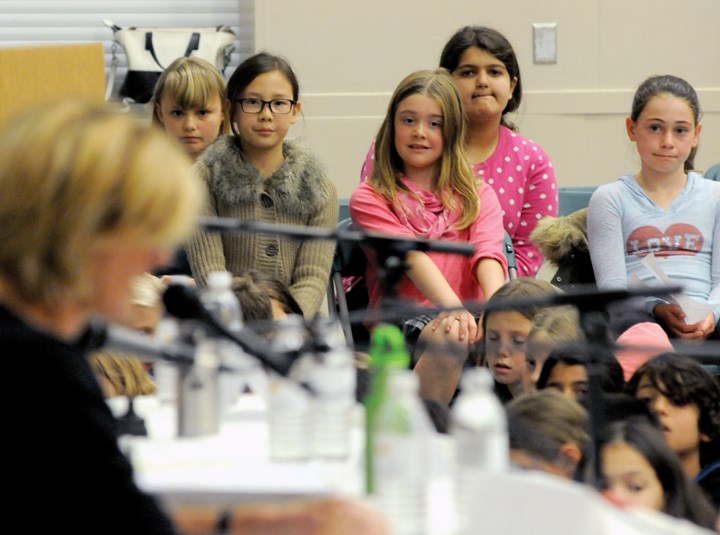Some of West Vancouver's would-be MPs interrupted their white-knuckled sprint to Oct. 19, Wednesday, to spend an hour talking politics with people who could not possibly vote for them.
The candidates took a break from their usual campaigns to address a crowd of 200 Grade 4 to 7 students at école Pauline Johnson elementary in Dundarave Wednesday. The event was organized by the Pauline Johnson parent advisory committee using curriculum provided by Civix Canada, but the students were in the driver's seat, moderating the debate.
The four questions they opted to ask, which were voted on by the student body, weren't so different from the ones seasoned journalists like to ask: What are the parties' plans for transportation and pollution? Why are you running? What is your party's stance on legalizing marijuana? And....
"With all the issues in our country, like the environment, housing and the economy, why are the parties focussing so much on the niqab issue?"
"Good question!" blurted out one of the adults gathered at the back of the room.
The candidates were then free to respond with their mostly familiar speeches. While Liberal Pamela Goldsmith-Jones and Conservative John Weston tailored their responses to the younger audience, often speaking on basic civics or Canadian history, Green Party candidate Ken Melamed was clearly using the same speaking notes he uses at typical all-candidates meetings.
"I'm seeking your support," he said, before stopping himself. "I'm not seeking your support. I'm seeking your parents' support," he added, drawing some light laughter from the crowd.
Goldsmith-Jones graduated from Pauline Johnson, as did her mother, and Weston said his three kids were also students there before the family moved to Ottawa. The event, which was aimed at planting the seeds of democratic engagement at a young age, was a success according to PAC member Eileen Huster.
"Some of us in the PAC really want our kids to become more knowledgeable and to
start learning at this young age what all this talk is about. It's bad enough trying to get parents and adults in politics but if you don't start getting (the kids) involved at a young age and having them understand how the process works, they'll become millennials who don't care," she said.
Most of the kids won't be able to vote until the 2020 general election, but a small scrum of students interviewed by the North Shore News outside the event said they'd be ready when their first voter information card arrives.
Less than 40 per cent of voters in the 18 to 24 demographic voted last time around, something the kids blame on plain old ignorance.
"I think maybe they're afraid they'll make a wrong decision. Or they didn't know who to vote for, or they thought they didn't get their facts right. They're afraid," said Parnian Ashraff.
"And maybe they didn't agree with the system," added Tahea Masselink.
The students will still have a chance to have their say. Schools participating in the program will hold a parallel election on Oct. 19.
All said their parents are actively talking about the election, but the pre-teens hadn't had much involvement in the campaign so far outside of class.
"My sister went door-to-door for the Liberals but she did that because it looked good on her resumé for university," said Samia Trottier.
Though it would hardly meet the statistical rigour expected of a riding level poll, the half-dozen students interviewed by the North Shore News indicated a neck-and-neck race between the Liberals and Conservatives, not so far off from what the professional pollsters are saying.



